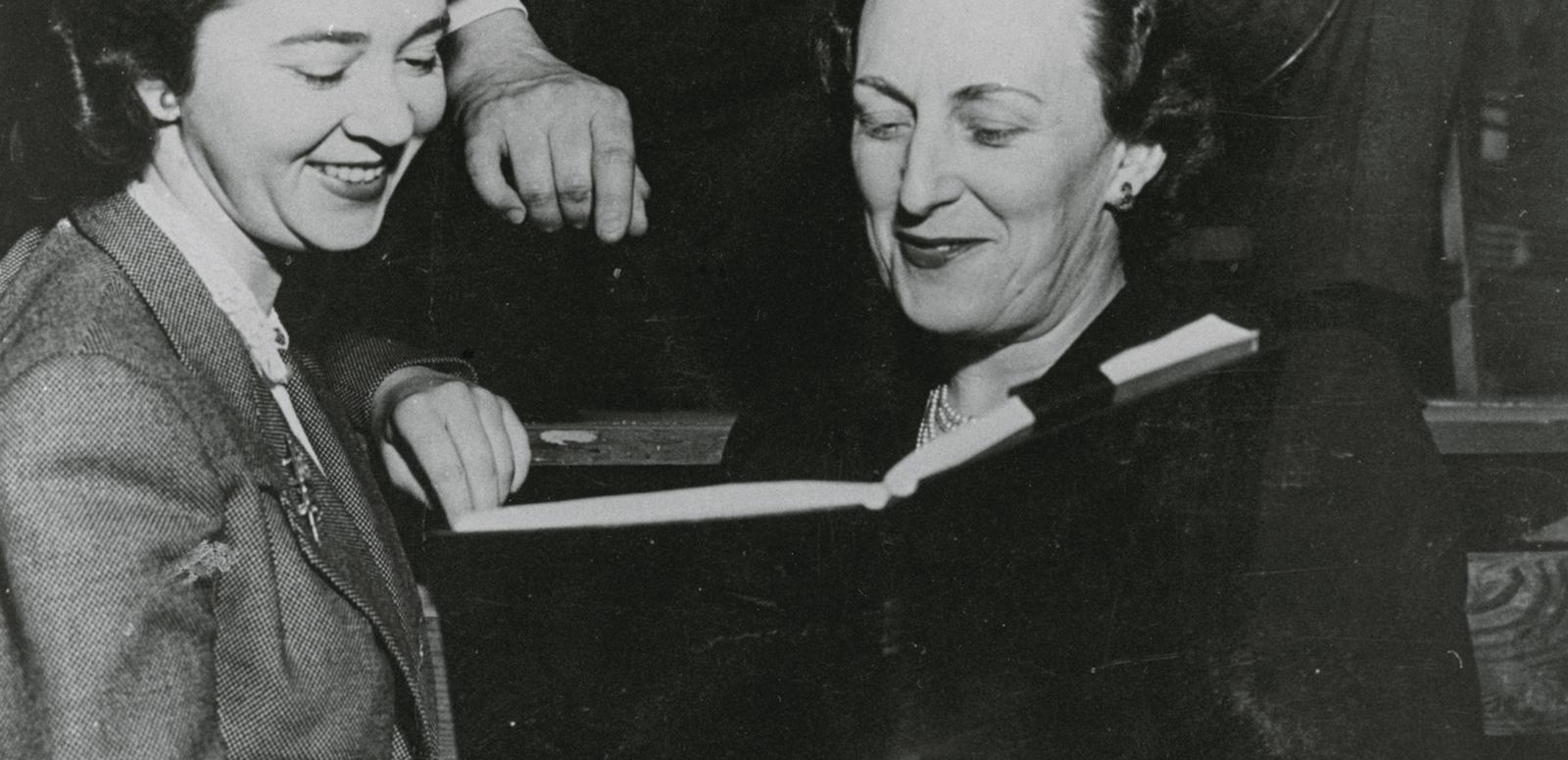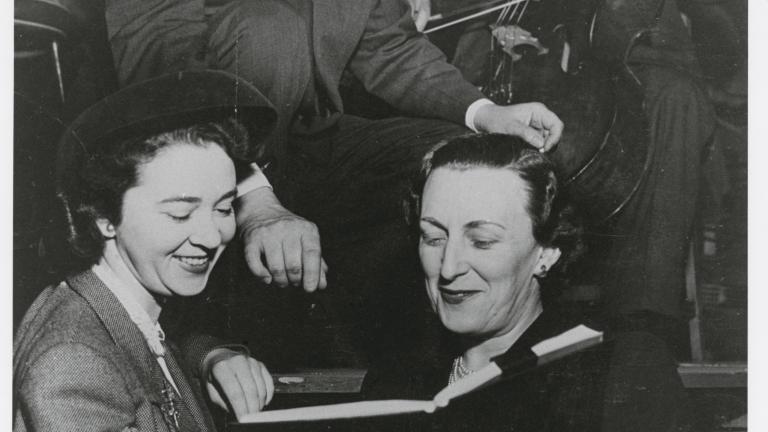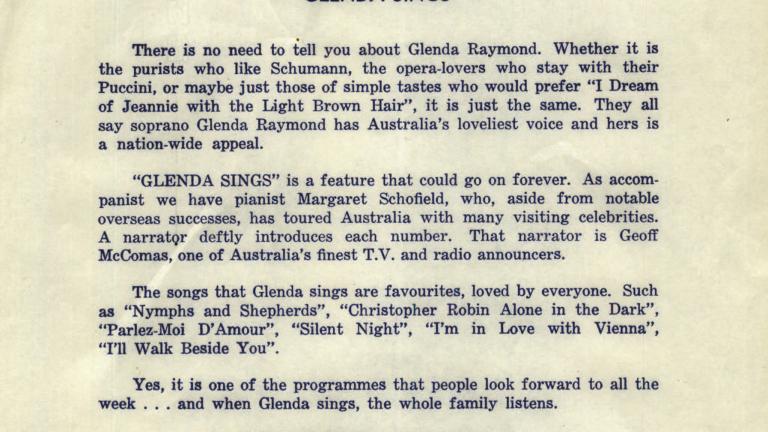Women played an important role during Australia’s early years of radio broadcasting. We look at the pioneering contribution of Dorothy Crawford.

Women played an important role during Australia’s early years of radio broadcasting. We look at the pioneering contribution of Dorothy Crawford.
Dorothy Crawford not only excelled as a radio drama producer, but was also a pioneer in the production of Australian television drama. Known in the industry as a hard taskmaster, Crawford was respected for her knowledge and attention to detail. As co-founder of Crawford Productions she made a significant contribution to the company’s success, which not only dominated radio production in Melbourne, but was one of the few independent production companies to successfully transition from radio to television in Australia.
Born in Melbourne in 1911, Dorothy Crawford studied voice and piano at the Albert Street Conservatorium in the Victorian Artists’ Society building in East Melbourne. Following her studies she initially focused on speech and drama, becoming an elocution teacher and leading the Dorothy Crawford Players, who performed at church and charity functions. Demonstrating initiative in establishing the Players, Crawford, in a far-reaching move, entered the Players in amateur dramatic radio competitions. This led to regular radio appearances for her on Melbourne station 3UZ in 1939, playing various characters on the program Happy Days, as well as the title role in the comedy series Little Audrey.
In 1942 she was engaged by the ABC as an announcer but left to join her brother Hector at the Melbourne radio production company Broadcast Exchange in 1944. A year later, with the help of David Worrall, manager of the 3DB radio station, the siblings started their own production company. During their early days in radio production, the Crawfords also established a broadcasting school to train radio announcers. The Crawford School of Broadcasting was not only useful for nurturing talent but also served the purpose of raising funds for radio production.
Dorothy Crawford’s experience in both music and drama was evident in her production of several radio series, for which she edited, cast and produced each script. These innovative productions were a complex blend of drama and music, incorporating the skills of professional actors and trained singers. Broadcast in 1946, The Melba Story, a radio dramatisation of Nellie Melba’s life with music, featured the newly discovered singer Glenda Raymond with the Australian Symphony Orchestra conducted by Hector Crawford.
Radio drama The Melba Story (1946) tells the story of Nellie Melba’s life. Courtesy: Crawford Productions Pty Ltd. NFSA title: 196592
The series The Blue Danube, a dramatised musical story of the life of Johann Strauss, was awarded the Federation of Commercial Broadcasting Stations Academy Award for the best half-hour radio program of 1948. In an ambitious move, Dorothy Crawford produced a series said to be the costliest Australian radio production at the time of its premiere in 1954, The Amazing Oscar Hammerstein, about the American theatrical impresario. The reputation of the company was established by the success and popularity of these series that incorporated concepts which may have seemed initially highbrow and not commercial.
Another successful vein for radio drama for the Crawfords was crime. The Crawfords-produced crime series D24 was based on files from the Victorian Police Force, who sponsored the first two years of production costs and studio time. This series was later transformed into the successful television series Homicide.
An early 1951 episode of popular crime series D24 (1951–60), based on real files from the Victorian Police Force. Courtesy: Crawford Productions Pty Ltd. NFSA title: 452172
Dorothy Crawford’s reputation as a perfectionist was well earned. Her grounding in drama was one of the reasons for her success in identifying issues in scripts and performance. In an oral history conducted for the NFSA, Wynne Pullman, who worked with her for six years as a casting director, described Crawford’s attention to detail and dedication to the company, often working long hours and hosting working dinners with scriptwriters.
Not only did Dorothy Crawford excel in writing, directing and acting, she also had the desire and ability to pass on her knowledge to others. In 1954, the Crawfords set up a television workshop in West Melbourne where writers, editors and producers were trained in the new medium. In 1960, Crawford produced Seagulls Over Sorrento for HSV 7 Melbourne, which was the first full-length television drama produced by an independent TV production company.
Dorothy Crawford contracted Parkinson’s disease in the 1960s. She continued to work, though her influence gradually waned as she was unable to continue her usual demanding workload. She retired in 1974 and passed away in 1988.

Dorothy Crawford with her brother Hector Crawford and Glenda Raymond, circa 1946. Courtesy: Crawford Productions Pty Ltd. NFSA title: 398660

Publicity material for Crawford Productions radio musical Glenda Sings (1955). Courtesy: Crawford Productions Pty Ltd. NFSA title: 670445
Books:
Lane, Richard and National Film and Sound Archive of Australia, 1994, The Golden Age of Australian Radio Drama 1923-1960: A History Through Biography, Melbourne University Press, Carlton South, Vic
Moran, Albert and Keating, Chris, 2009, The A to Z of Australian Radio and Television, Scarecrow Press, Lanham
Newspapers:
‘Radio Features: Broadcast from Cruiser’, The Advertiser, 2 February 1946, p 7
‘Radio Plays’, The Argus, 24 August 1938, p 2
‘It’s A Family Verdict’, The Australian Women’s Weekly, 4 July 1962, p 38
‘New £20,000 Serial From 5 AD’, The Advertiser, 26 June 1954, p 11
‘Academy Award of the Radio’, Examiner, 7 January 1949
Oral histories:
Pullman, Wynne interviewed by Beverley Dunn, NFSA title: 270522
Crawford, Hector interviewed by Albert Moran, NFSA title: 269138
This article was first published in 2013. The text was updated in 2023.
Want to be the first to hear stories and news from the NFSA?
Subscribe to our newsletter and never miss out.
The National Film and Sound Archive of Australia acknowledges Australia’s Aboriginal and Torres Strait Islander peoples as the Traditional Custodians of the land on which we work and live and gives respect to their Elders both past and present.